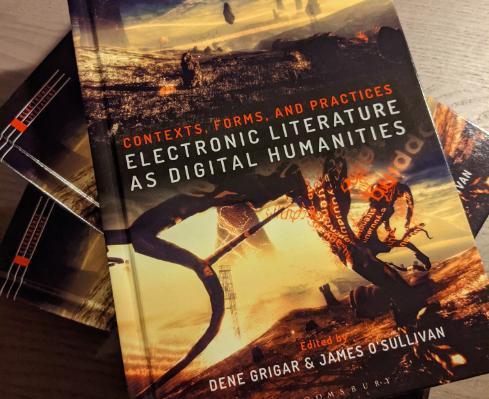In This Section
- English
- About the Department
- People
- Study
- Research
- News
- Media Gallery
- Edmund Spenser in Cork - School of English UCC
- Mary Breen: Pride and Prejudice
- MA in Irish Writing and Film
- Ann Coughlan: The Irish Influence on America's Greatest Abolitionist
- MA in Modernities: Romanticism, Modernism, Postmodernism
- MA in American Literature and Film
- MA in English Texts and Contexts: Medieval to Renaissance
- PhD in English
- Prof. Claire Connolly
- Tonio Colona - PhD in the School of English, UCC
- Prof Patricia Coughlan
- Mike Waldron - PhD in the School of English
- Ken Rooney and Heather Laird Book Launch
- School Welcome Event September 2014
- Contemporary American Trauma Narratives Book Launch
- Staged Transgressions in Shakespeare's England
- Seamus Heaney Memorial Event September 2013
- Creative Writing
- Current Students
- Student Achievements
- Digital Humanities
- Creative Writing
Electronic Literature as Digital Humanities

We are pleased to announce the publication of Electronic Literature as Digital Humanities: Contexts, Forms, & Practices. Published by Bloomsbury, the collection of essays by e-lit scholars and practitioners is edited by Prof. Dene Grigar, Washington State University Vancouver, and Dr James O’Sullivan, Department of Digital Humanities, University Cork College.
Electronic Literature as Digital Humanities provides a detailed account of born-digital literature by artists and scholars who have contributed to its birth and evolution. This book treats electronic literature from the perspective of the digital humanities (DH), that is, as an area of scholarship and practice that exists at the juncture between the literary and the algorithmic.
The domain of DH is typically segmented into the two seemingly disparate strands of criticism and building, with scholars either studying the synthesis between cultural expression and screens or the use of technology to make artifacts in themselves. This book regards electronic literature as fundamentally DH in that it synthesizes these two constituents.
Electronic Literature as Digital Humanities provides a context for the development of the field, informed by the forms and practices that have emerged throughout the DH moment, and will be of interest to readers looking to learn more about electronic literature.
Digital Humanities
Daonnachtaí Digiteacha
Contact us
Room 2.22, O'Rahilly Building, University College Cork, Ireland
